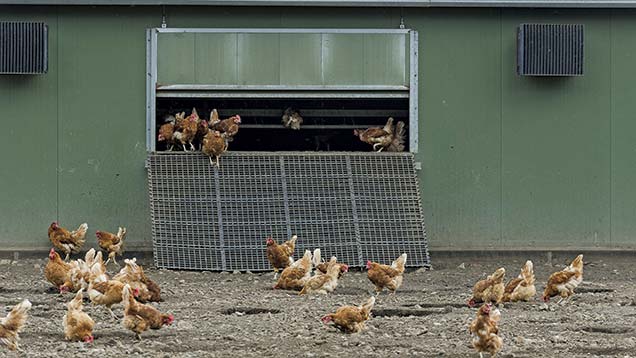How reducing stress in layers helps stop feather pecking
 © Rex
© Rex Egg producers have been advised to ditch routine in order to reduce stress in fearful flocks of laying birds.
Two distinguished animal welfare scientists advised an audience of Scottish egg producers at a Feather Pecking Workshop in Perth that irregular management techniques and frequent changes to flock routine should be introduced as early as possible in a bird’s life in order to make it robust and less fearful.
Bas Rodenburg, an assistant professor of poultry behaviour and welfare at Wageningen Unversity in the Netherlands, said that feather pecking could happen in any flock if it wasn’t prepared for stress. But he insisted that birds could be habituated to changes in their environment, which reduced the risks.
He advised: “Be dynamic in your approach, adopt different walking routes, make it a changing environment, train the birds that you could come in and clear away litter at any time. You can’t have a flock where nothing happens. I’d encourage producers to talk about this and exchange their ideas and experiences.”
See also: Cannibalism hits beak trimming trial
Sarah Lambton, a research associate at Bristol University’s School of Veterinary Sciences, presented the same message. “Get the birds used to variety being their routine, not routine being their routine,” she said.
“Play different channels on the radio, open their pop holes at a different time in the day – these can be big changes in a bird’s life. The best protection against feather pecking is being as proactive as possible.”
For his PhD, Dr Rodenburg studied feather pecking behaviour in laying hens and how it related to other behavioral characteristics, such as a bird’s ability to cope with fear and stress. He argued that, for welfare reasons, he believed a ban on beak-trimming was advisable.
He said: “When you have a flock that is severely affected by pecking it is a welfare issue. But at the same time beak trimming, even with infrared, is still painful for the bird and affects them in early life when the tip has just been removed.
“So in the end I would want to move away from beak trimming. But we have to be ready for it, and if it takes a bit longer in one country than another, I don’t have any problems with that.”
Dr Rodenburg revealed Dutch egg producers faced a ban on beak-trimming in 2018, but they were already under commercial pressure to switch systems much earlier.
“Producers are being asked for eggs from non beak-trimmed flocks now, particularly from German retailers, and Dutch egg production is very dependent on the German market,” he said. “The movement is continuing and we’re almost being forced to change.
“Farmers are responding by starting to make one of their flocks non-beak trimmed and comparing it with their beak-trimmed flocks. Producers are also being monitored by researchers who are giving advice on best management practices. And farmers are informing one another by sharing their experiences. All of that should allow the sector to be ready for the change.”
Dr Rodenburg conceded that it was more challenging for producers to manage flocks that hadn’t been beak-trimmed.
“But it’s not impossible,” he insisted. “You need better management and a better eye on your birds. You need to be very attentive to changes. There are already very good examples in organic flocks and also large, non-organic flocks where systems are running without problems. Sometimes it goes wrong, but I hope we can minimize the number of times that happens.”
Bristol trials on non-beak trimming
The long-awaited study by the University of Bristol into management strategies in intact beak flocks is due to be presented to Defra in February, Dr Lambton from the university’s School of Veterinary Sciences told the conference.
It is understood that most of the 20 flocks involved in the trials have now been depleted. Interim figures, revealed by the British Free Range Egg Producer’s Association last October, suggested mortality in non-beak trimmed flocks was running at over 10%.
The pan-industry Beak Trimming Action Group is next scheduled to meet on 2 March. But it is generally accepted that the government review of the proposed beak trimming ban will not happen until well after the general election, and a final decision on whether to introduce a ban or not will not be taken until late in the year.
